The Union Budget 2025-26 introduces a series of measures aimed at strengthening the Micro, Small, and Medium Enterprises (MSME) sector, recognising its role as one of the key engines in India’s journey of development, alongside agriculture, investment, and exports. To help businesses expand and improve efficiency, the investment and turnover limits for MSME classification have been raised. Access to credit is set to improve with an increase in the credit guarantee cover for micro and small enterprises, startups, and export-focused MSMEs. A new scheme will provide financial support to first-time entrepreneurs from disadvantaged backgrounds, while sector-specific initiatives will enhance productivity in areas such as footwear, leather, and toy manufacturing.

As a vital contributor to India’s industrial landscape, the MSME sector plays a crucial role in manufacturing, exports, and employment. With 5.93 crore registered MSMEs employing more than 25 crore people, these enterprises generate a significant share of the country’s economic output. In 2023-24, MSME-related products accounted for 45.73% of India’s total exports, reinforcing their role in positioning the country as a global manufacturing hub. The new budgetary provisions aim to build on this strong foundation by fostering innovation, enhancing competitiveness, and ensuring better access to resources. Through these steps, the government seeks to equip MSMEs with the tools needed to expand their reach and strengthen their contribution to India’s economic growth.
Key Measures for MSMEs in Union Budget 2025-26
The Union Budget 2025-26 introduces a series of measures aimed at strengthening the MSME sector by enhancing credit access, supporting first-time entrepreneurs, and promoting labour-intensive industries.
Revised Classification Criteria
To help MSMEs scale operations and access better resources, the investment and turnover limits for classification have been increased by 2.5 times and 2 times, respectively. This is expected to improve efficiency, technological adoption, and employment generation.
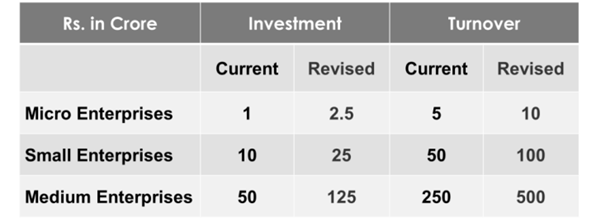
Enhanced Credit Availability
- The credit guarantee cover for micro and small enterprises has been increased from ₹5 crore to ₹10 crore, enabling additional credit of ₹1.5 lakh crore over five years.
- Startups will see their guarantee cover double from ₹10 crore to ₹20 crore, with a reduced fee of 1% for loans in 27 priority sectors.
- Exporter MSMEs will benefit from term loans up to ₹20 crore with enhanced guarantee cover.
Credit Cards for Micro Enterprises
- A new customised Credit Card scheme will provide ₹5 lakh in credit to micro enterprises registered on the Udyam portal, with 10 lakh cards set to be issued in the first year.
Support for Startups and First-Time Entrepreneurs
- A new Fund of Funds with ₹10,000 crore will be established to expand support for startups.
- A scheme for 5 lakh first-time women, Scheduled Caste, and Scheduled Tribe entrepreneurs will provide term loans up to ₹2 crore over five years, incorporating lessons from the Stand-Up India scheme.
Focus on Labour-Intensive Sectors
- A Focus Product Scheme for the footwear and leather sector will support design, component manufacturing, and non-leather footwear production, expected to create 22 lakh jobs and generate a turnover of ₹4 lakh crore.
- A new scheme for the toy sector will promote cluster development and skill-building, positioning India as a global toy manufacturing hub.
- A National Institute of Food Technology, Entrepreneurship and Management will be established in Bihar to boost food processing industries in the eastern region.
Manufacturing and Clean Tech Initiatives
- A National Manufacturing Mission will provide policy support and roadmaps f or small, medium, and large industries under the Make in India initiative.
- Special emphasis will be given to clean tech manufacturing, fostering domestic production of solar PV cells, EV batteries, wind turbines, and high-voltage transmission equipment.
Budgetary Outlay of Ministry of MSME
(In Rs. Crore)
|
Financial Year |
Budget Estimates |
Revised Estimates |
|
2019-20 |
7,011.29 |
7,011.29 |
|
2020-21 |
7,572.20 |
5,664.22 |
|
2021-22 |
15,699.65 |
15,699.65 |
|
2022-23 |
21,422.00 |
23,628.73 |
|
2023-24 |
22,137.95 |
22,138.01 |
|
2024-25 |
22,137.95 |
17,306.70 |
|
2025-26 |
23,168.15 |
– |
Current Landscape of MSMEs in India
The MSME sector continues to be a cornerstone of India’s economic growth, contributing significantly to employment, manufacturing, and exports. In recent years, the sector has displayed remarkable resilience, with its share in the country’s Gross Value Added (GVA) increasing from 27.3% in 2020-21 to 29.6% in 2021-22 and 30.1% in 2022-23, highlighting its growing role in national economic output.
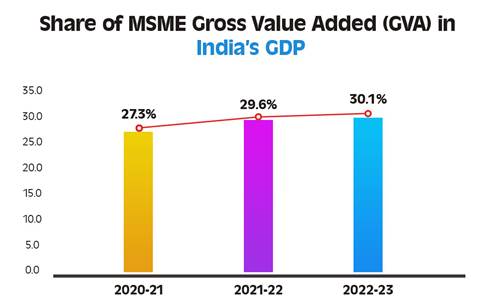
Exports from MSMEs have seen substantial growth, rising from ₹3.95 lakh crore in 2020-21 to ₹12.39 lakh crore in 2024-25. The number of exporting MSMEs has also surged, increasing from 52,849 in 2020-21 to 1,73,350 in 2024-25.
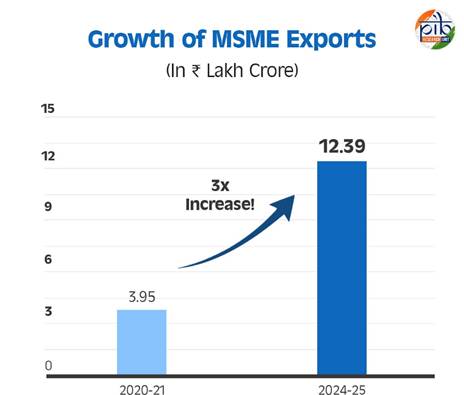
Their contribution to India’s total exports has steadily grown, reaching 43.59% in 2022-23, 45.73% in 2023-24, and 45.79% in 2024-25 (up to May 2024). These trends underscore the sector’s increasing integration into global trade and its potential to drive India’s position as a manufacturing and export hub.
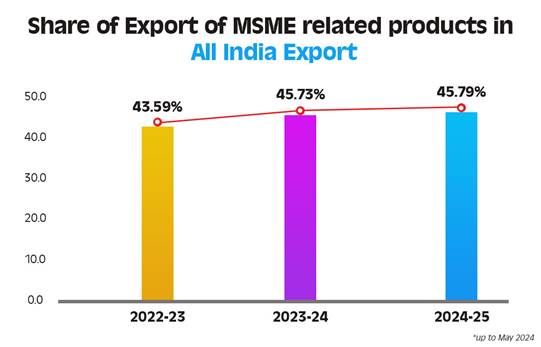
Government Initiatives for MSMEs
The Government of India has implemented a robust array of initiatives aimed at bolstering the Micro, Small, and Medium Enterprises (MSME) sector, recognizing its pivotal role in the economy. These efforts range from financial support and procurement policies to capacity building and market integration. Key initiatives include the Udyam Registration Portal, PM Vishwakarma scheme, PMEGP, SFURTI, and the Public Procurement Policy for MSEs, all aimed at fostering entrepreneurship, enhancing employment, and integrating informal sectors into the formal economy. These initiatives reflect the government’s commitment to supporting MSMEs and driving inclusive economic growth nationwide.
The ‘PM Vishwakarma’ scheme, launched by the Government of India, aims to enhance the quality and reach of products and services by artisans and craftspeople, integrating them into domestic and global value chains. Announced in the 2023-24 Budget and launched on September 17, 2023, this scheme seeks to provide comprehensive support to Vishwakarmas, improving their socio-economic status and quality of life.
PM Vishwakarma is fully funded by the Government of India with an initial outlay of Rs. 13,000 crores for 2023-24 to 2027-28.
Since its launch, the PM Vishwakarma scheme has achieved significant milestones, with over 2.65 crore applications submitted and 27.13 lakh applications successfully registered. Registered applicants will undergo a 5-day ‘Basic Training’ program, and those opting for credit support will receive collateral-free credit. These accomplishments highlight the scheme’s early success in empowering artisans and craftspeople nationwide.
Udyam Registration Portal
Launched on July 1, 2020, the Udyam Registration Portal serves as a pivotal platform for facilitating the registration of enterprises across India. The portal encourages enterprises previously registered under the Udyog Aadhaar Memorandum and Entrepreneurship Memorandum-II to migrate to this new system. It offers a free, paperless, and self-declaration-based registration process, eliminating the need for document uploads, thus simplifying the formalization of businesses.
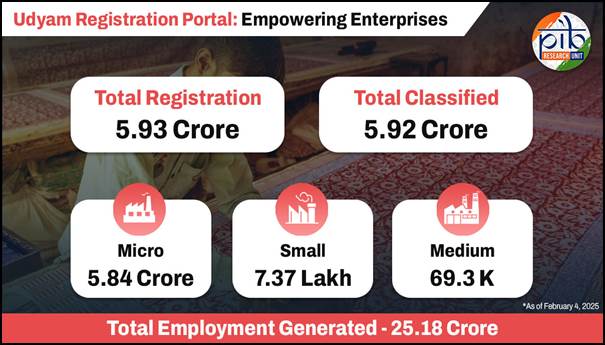
In a significant step towards integrating informal micro-enterprises into the formal economy, the Government introduced the Udyam Assist Platform on November 11, 2023. This initiative aims to bring these micro-enterprises under the formal sector, enabling them to access benefits such as Priority Sector Lending, which is essential for their growth and sustainability.
As of February 4, 2025, the Udyam Portal boasts an impressive total of 5,93,38,604 registered MSMEs, with the vast majority classified as micro-enterprises. Beyond their economic contributions, these MSMEs have generated substantial employment opportunities, providing jobs to over 25.18 crore individuals. This extensive employment generation underscores the sector’s crucial role in driving economic development and enhancing social stability by offering livelihoods to millions across the country.
Prime Minister’s Employment Generation Programme (PMEGP)
Prime Minister’s Employment Generation Programme (PMEGP) is a credit linked subsidy scheme for providing employment opportunities through establishment of micro-enterprises in the non-farm sector. Under the Scheme, Margin Money (Subsidy) is provided to beneficiaries availing loan from banks for setting up new enterprises. The maximum project cost admissible for setting up of new project is Rs. 50 lakhs in manufacturing sector and Rs. 20 lakhs in Service Sector
Subsidies under PMEGP vary by category:
- Special Categories, including SC, ST, OBC, Minorities, Women, Ex-Servicemen, Transgenders, Differently-abled individuals, NER, Aspirational Districts, and Hill and Border areas, are eligible for a subsidy of 25% in urban areas and 35% in rural areas
- General Category applicants are eligible for a subsidy of 15% in urban areas and 25% in rural areas.
In a notable development, units in Aspirational Districts and Transgenders have been included in the Special Category. Additionally, geo-tagging of PMEGP units has been initiated to capture details of the products and services offered by these units and to create market linkages for them. Furthermore, prospective entrepreneurs receive free 2-day Entrepreneurship Development Programme (EDP) training to equip them with the necessary skills and knowledge to succeed.
In 2023-24, the Prime Minister’s Employment Generation Programme (PMEGP) supported 89,118 enterprises, facilitating entrepreneurship across various sectors. The scheme disbursed ₹3,093.87 crore as margin money subsidy, enabling small businesses to scale operations and sustain growth. As a result, an estimated 7,12,944 employment opportunities were generated, reinforcing PMEGP’s role in strengthening self-employment and job creation nationwide.
Scheme of Fund for Regeneration of Traditional Industries (SFURTI)
Launched in 2005-06, the Scheme of Fund for Regeneration of Traditional Industries (SFURTI) aims to organize traditional artisans into collectives or clusters, facilitating product development, diversification, and value addition. The scheme promotes traditional sectors and seeks to sustainably increase the income of artisans. SFURTI was revamped in 2014-15 to further enhance its impact and reach.
The primary objective of SFURTI is to organize artisans and traditional industries into clusters to improve competitiveness, create employment opportunities, and enhance the marketability of their products. By bringing artisans together, the scheme helps them leverage collective resources and skills, leading to better income prospects and sustained growth.
Achievements:
- Since 2014-15, SFURTI has approved the formation of 513 clusters and 376 clusters have successfully become functional.
- A total grant of ₹1,336 crore has been extended to support these clusters.
- Sustainable employment opportunities have been generated for around 2,20,800 artisans in 376 functional clusters (as on 12 Dec 2024).
Public Procurement Policy for Micro and Small Enterprises
The Ministry of MSME, Government of India, notified the Public Procurement Policy for Micro and Small Enterprises (MSEs) in 2012. This policy mandates that 25% of annual procurement by Central Ministries, Departments, and Central Public Sector Enterprises (CPSEs) must be sourced from MSEs. Within this 25%, 4% is reserved for MSEs owned by Scheduled Castes/Scheduled Tribes (SC/ST), and 3% is reserved for MSEs owned by women entrepreneurs. Additionally, 358 items are exclusively reserved for procurement from MSEs.

(Year: 2023-24)
Achievements:
- In 2023-24, Central Ministries, Departments, and CPSEs procured a total of ₹74,717 crore worth of goods and services from MSEs, which constituted 43.71% of their total procurement.
- This policy benefitted 2,58,413 MSEs, ensuring they had access to significant business opportunities and support through government procurement.


